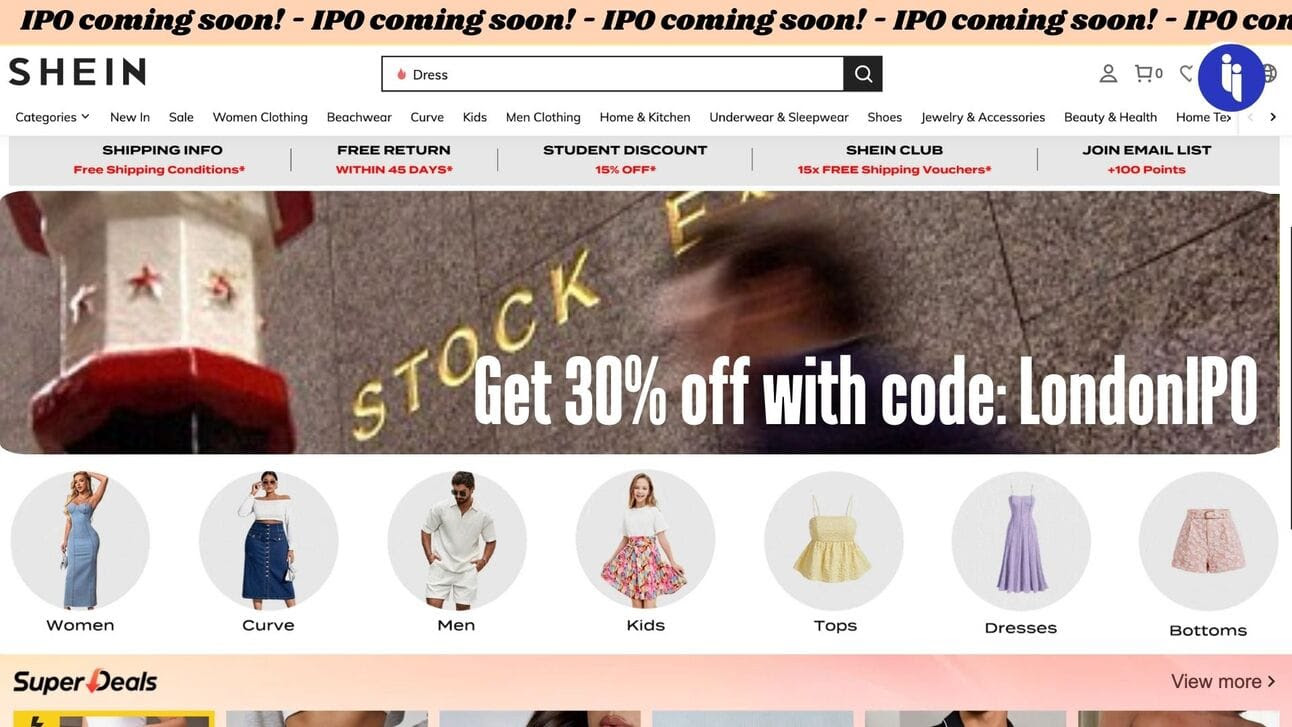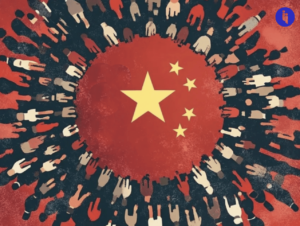Shein, China’s fast-fashion colossus, is reportedly set to file for a London listing as soon as this week, though the timeline for the actual float isn’t yet clear. The brand, which gained popularity in recent years by selling hyper-cheap and hyper-trendy clothes online, is aiming to sell $1.3B in shares at a valuation of ~$64B.
Where’s the intrigue?
China-born Sky Xu co-founded Shein back in 2012. He started it as an e-commerce play for wedding dresses, before expanding into the wider world of womenswear and beyond. And after tripling its sales during Covid, Shein is now:
Stay on top of your world from inside your inbox.
Subscribe for free today and receive way much more insights.
Trusted by 122,000+ subscribers
No spam. No noise. Unsubscribe any time.
- The largest e-commerce-only fashion retailer globally
- The world’s most-downloaded fashion app, and
- It generates $2B in profits by selling $45B in gear each year.
But here’s why Shein’s initial public offering (IPO) piqued our interest:
- Shein initially wanted to list in the US
Shein filed early paperwork to list on the New York Stock Exchange last year, but it soon hit regulatory, political, and geopolitical hurdles: eg, concerns around its use of US user data, Xinjiang cotton tainted by forced labour claims, and an ongoing US-China tussle around US investor risk warnings on China.
Interestingly, Shein had – like TikTok and others – already relocated its HQ to Singapore in an effort to distance itself from Beijing. But US concerns lingered, regulator talks dragged on, and a top US retail lobby group even declined Shein’s membership (presumably in part due to Shein’s impact on US retailers).
So the firm started to look elsewhere, though without pulling out of New York.
- IPOs by China-based firms are less frequent
We’ve seen fewer IPOs by China-based firms since 2021, for three main reasons:
First, IPOs are down everywhere, as international uncertainty curbs investor and investee expectations alike (though some markets are showing life this year).
Second, China’s cooling economy has tapped the IPO brakes further.
And third, Beijing’s regulators now also play a bigger IPO role, adding delays and a dash of unpredictability – just ask Didi (China’s Uber), which famously delisted in New York after copping a surprise probe by China’s cyber watchdog.
- This could be London’s biggest-ever IPO
Finally, it’s been a rough ride lately for the London Stock Exchange, with record low IPO proceeds last year and a yawning valuation gap with New York. This all nudged a UK tech leader (Arm) to shift its listing to New York last year, and there’s talk of oil major Shell (London’s second-largest listing) following suit.
So London has moved to relax its listing rules to boost competitiveness. And of course, a record new listing from Shein could re-establish the City as a financial hub, while pumping cash back through its financial services sector.
So this is all why, in addition to cobalt, chips, and AI, you can now add that $14.95 Tie Dye Puff Sleeve Smock Dress to your list of things caught up in geopolitics.
INTRIGUE’S TAKE
One of the factors that makes this story so intriguing is its trade-offs:
- Shein presumably expected a higher valuation in New York, but that’d also come with higher scrutiny
- That scrutiny would likely involve pledges not to use Xinjiang cotton, but that’d just irritate Beijing, which insists Xinjiang cotton is fine
- The last time London moved to trade away some rules to attract a big listing (Saudi Aramco), it copped flak and still lost the listing, and
- It’s a reminder that while China’s consumer market gives it leverage to shape the world, US capital markets give the US leverage, too.
Also worth noting:
- China allowed US regulators access to certain audit documents in 2022, helping avoid the US delisting of ~200 Chinese companies.
- Despite being founded in China, Shein doesn’t sell there. This is due in part to the unique dynamics of China’s market, which make Shein’s business model less competitive in its home country.
- France is currently mulling the world’s first ‘fast fashion bill’, with new taxes and a marketing ban on ultra-cheap apparel. Critics in China say it’s an attempt to protect Europe’s fashion sector from China’s Shein and Temu, who’ve pioneered ultra-flexible supply chains.









